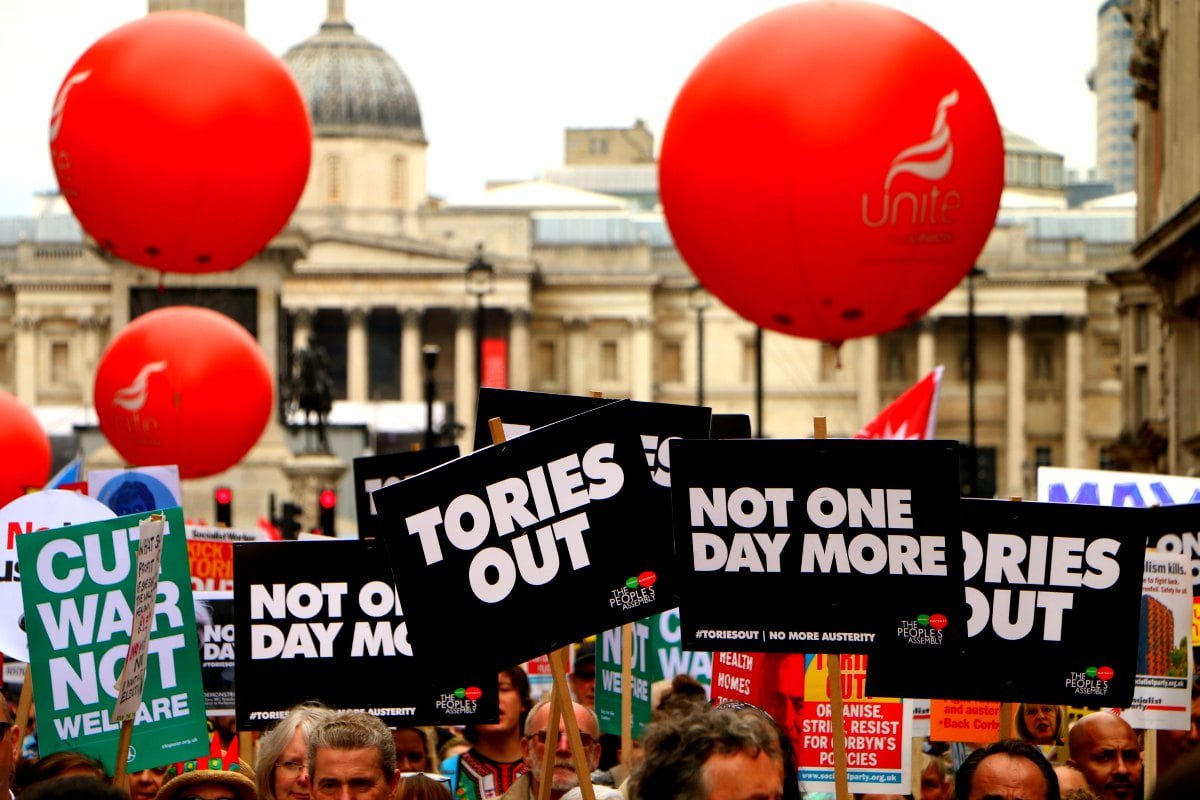The trade union movement should use Saturday’s TUC demonstration as a platform to mobilise a wave of co-ordinated strike action against the Tory government.
This Saturday, thousands of workers and trade union activists will gather in London for the TUC-organised demonstration and rally, called under the banner of “A new deal for working people.”
The TUC demonstration assembles on Embankment from 11am, before marching to Hyde Park at midday.
A national demonstration like this can play a very important role – but only if it is linked to a mass campaign to drive out the Tories and act as the start of a real fightback.
While working people have been crying out for a lead, the TUC leaders, the supposed “general staff” of the movement, have been dragging their feet, fearing any militant action. A co-ordinated public sector strike was entirely possible in the last period, but was allowed to fall apart by the leaders, starting with the TUC.
That is why there is a certain frustration at demonstrations like this. Instead of using them as the beginning of a militant campaign, the trade union leaders have viewed mass demonstrations as a means of “letting off steam”; or, even worse, simply as a day out, allowing members to parade in the sun beneath our banners and balloons, before all going home to leave the leaders to “sort things out”.
Bitter experience suggests that the trade union leaders will always seek the easy way out, always looking for a “compromise” with the employers or the Tory government. The TUC has been good at writing reports, but not much else.
Even when they are forced to act, under pressure from below, they work to dissipate the action. A clear example of this was the debacle in 2011. The TUC coordinated a campaign of action over pensions, culminating in the de facto public sector general strike of 29 November. But this was followed by the government’s old “divide and rule” tactic.
The pensions campaigns were split into sectoral fights, resulting in the trade union leaders missing the opportunity to strike home. For civil servants, who have something like 1,500 bargaining units, the failure to follow up the huge show of strength in 2011 led the movement into a blind alley.
Instead of putting their full weight behind the Southern Rail dispute, the TUC went behind the back of the RMT to organise a meeting at Congress House with the bosses of Southern Rail and ASLEF leaders. This blatant attempt to undermine the dispute was an absolute scandal.
The opposition to the pay cap is enormous, in spite of so-called concessions from the government. This issue alone could have been used to mobilise a mass united movement. A one-day general strike would have been possible. But the leadership has acted as a brake.
The trade union leaders always tend to point towards the “difficulties” in organising action. However, the big majorities in recent ballots for industrial action shows the potential that exists.
The entire history of the labour movement illustrates the fact that it is the militant action of the working class, fighting for a better world, which is the motivating force in social change. Had the militant pioneers of the trade unions limited themselves to family fun days and “letting off steam”, the general unions would never have been built and neither would the Labour Party.
Today, the level of social inequality and the instability and uncertainty facing workers and young people is at its highest since the 1930s. Even the most basic social advances won in the past now require the greatest effort to preserve and defend them. Reforms that the capitalists gave with their left hand are now being taken back twice over with their right. That means that the old methods don’t work anymore. The bosses won’t give way unless absolutely forced to do so.
Socialist Appeal has pointed out many times that, within the constraints of a sick and diseased capitalist system, any political programme that limits itself to reform will inevitably be undermined by the contradictions of the system. In truth, the crisis of capitalism is also a crisis for those leaders who think that capitalism is the only possible system.
Over the last few years, the Labour Party has been refreshed after decades of domination by the right wing. The level of activity has increased, and this has had quite an influence inside the trade union movement as well. At last we have Labour Party leaders who are listening to the concerns of the members. But this process is still in its early days.
The labour movement needs to step up to the mark. Our weapons are ideas and perspectives. The challenge for Jeremy Corbyn and for all active workers is to channel the anger and energy of the poor, the exploited, the organised and unorganised; to use demonstrations like this not to let off steam but to show workers and young people how to change society.
As such Socialist Appeal supporters will be there on 12th May – patiently explaining why capitalism has to go and how to get rid of it.






